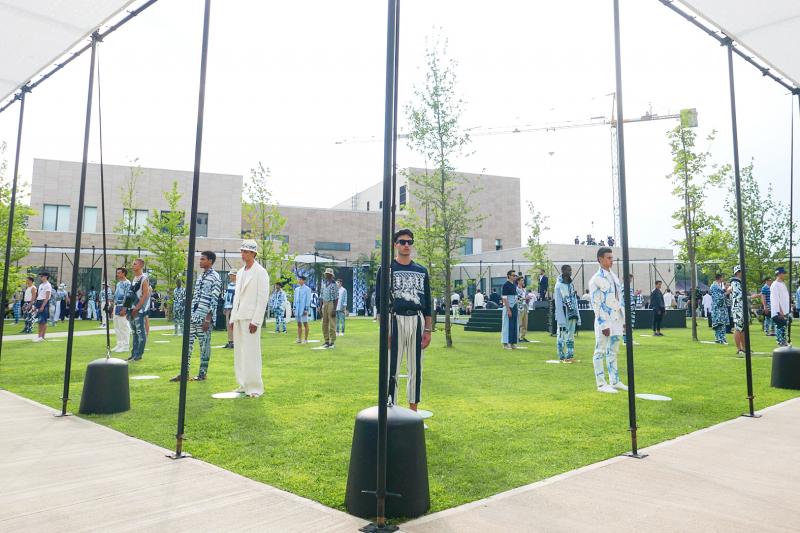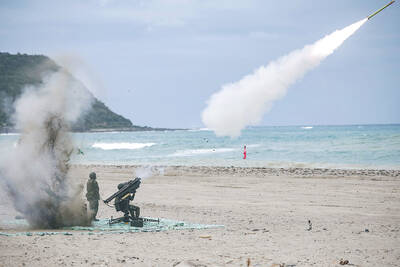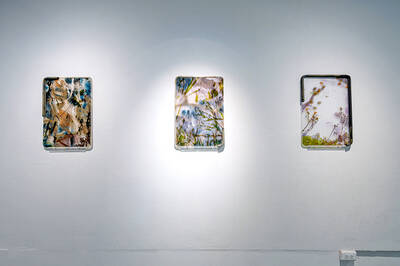Milan kicked off its first Digital Fashion Week on Tuesday with two live runway shows on the schedule, including from heavyweights Dolce & Gabbana, to send out a message of “positivity.”
Running through today, this “phygital” fashion week — featuring both physical and digital shows — will present the Men’s Spring/Summer 2021 collections, as well as men’s and women’s pre-collections, with about 40 brands answering the call. This is the third such show after London and Paris and Italy’s first fashion week since the coronavirus crisis.
Starting off the week was MSGM, with Italian designer Massimo Giorgetti presenting a colorful collection in a video short full of pep, showing young people having fun at a carnival, canoodling by a lake or gazing into each others’ eyes, with the motto: “I don’t know where, but together.”

Photo: REUTERS
Also Tuesday, Prada presented a video in five chapters, the work of five different artists including US filmmaker Terence Nance and video artist Martine Syms, featuring a stark, mostly black and white collection. Despite its cinematic format, the final chapter was none other than a filmed runway show. The clothes are “simple... with a use and a value” because “when times become more complex, the clothes become straightforward, unostentatious,” the Italian house said in a statement. Presentations from Moschino and Philipp Plein were set to follow, while on Wednesday it will be the turn of the Italian firm Etro and D&G, who will both be on the catwalk for real, in-person fashion shows.
“We decided to present the collections with a physical fashion show to give a strong positive message, fundamental at this time for the fashion system and the city of Milan,” Kean and Veronica Etro wrote in a statement.
“Real interaction is fundamental to fashion.”

Photo: REUTERS
Etro will be hold its show at the Four Seasons Hotel located in a converted 15th-century convent, while D&G has chosen the gardens of the university campus of the Humanitas Hospital, which has been involved in coronavirus research and which the fashion brand supports financially.
Last month, Sicilian designers Domenico Dolce and Stefano Gabbana announced their return to the Italian Fashion Chamber (Camera Nazionale della Moda Italiana) and to the official calendar for the first time in more than two decades. Differences with the management of the shows had prompted them to leave the system in 1998. The chamber’s president, Carlo Capasa, called it “a great return”.
Capasa, who said the fashion industry anticipates a sales drop of between 20 to 30 percent this year due to coronavirus, said on Tuesday that the shows hoped to “give a message of positivity and energy” to the industry. “The fact that so many brands participate in our Fashion week... gives a message of hope and trust in our industry,” Capasa said.
DIGITAL VS REAL
The week continues with Salvatore Ferragamo, Tod’s and Dsquared2 yesterday and closes today with Gucci, Ermenegildo Zegna and Missoni. To accommodate buyers, the chamber will offer live appointments round the clock over various time zones. In addition to the fashion shows, brand presentations, interviews and backstage sessions, virtual “theme rooms” will cover a wide range of topics such as sustainable development, diversity and technological innovations. Two other digital events, International Hub Market and Together for Tomorrow, are dedicated to up and coming designers. It remains to be seen how buyers and the media react to Milan’s hybrid fashion week. The Paris shows that ended Monday were presented in video, with some critics saying the new format fell somewhat flat.
“Digital has a long way to go — light years — before it can replace the live fashion event,” wrote fashion trade paper Women’s Wear Daily, citing “the genuine, enjoyable intimacy of actually ‘being there’” for a one-time-only fashion show.
Barring a new wave of coronavirus, Milan is expected to return, for the most part, to physical fashion shows for its Spring-Summer 2021 Women’s collections from Sept. 22 to 28.

In late October of 1873 the government of Japan decided against sending a military expedition to Korea to force that nation to open trade relations. Across the government supporters of the expedition resigned immediately. The spectacle of revolt by disaffected samurai began to loom over Japanese politics. In January of 1874 disaffected samurai attacked a senior minister in Tokyo. A month later, a group of pro-Korea expedition and anti-foreign elements from Saga prefecture in Kyushu revolted, driven in part by high food prices stemming from poor harvests. Their leader, according to Edward Drea’s classic Japan’s Imperial Army, was a samurai

The following three paragraphs are just some of what the local Chinese-language press is reporting on breathlessly and following every twist and turn with the eagerness of a soap opera fan. For many English-language readers, it probably comes across as incomprehensibly opaque, so bear with me briefly dear reader: To the surprise of many, former pop singer and Democratic Progressive Party (DPP) ex-lawmaker Yu Tien (余天) of the Taiwan Normal Country Promotion Association (TNCPA) at the last minute dropped out of the running for committee chair of the DPP’s New Taipei City chapter, paving the way for DPP legislator Su

It’s hard to know where to begin with Mark Tovell’s Taiwan: Roads Above the Clouds. Having published a travelogue myself, as well as having contributed to several guidebooks, at first glance Tovell’s book appears to inhabit a middle ground — the kind of hard-to-sell nowheresville publishers detest. Leaf through the pages and you’ll find them suffuse with the purple prose best associated with travel literature: “When the sun is low on a warm, clear morning, and with the heat already rising, we stand at the riverside bike path leading south from Sanxia’s old cobble streets.” Hardly the stuff of your

Located down a sideroad in old Wanhua District (萬華區), Waley Art (水谷藝術) has an established reputation for curating some of the more provocative indie art exhibitions in Taipei. And this month is no exception. Beyond the innocuous facade of a shophouse, the full three stories of the gallery space (including the basement) have been taken over by photographs, installation videos and abstract images courtesy of two creatives who hail from the opposite ends of the earth, Taiwan’s Hsu Yi-ting (許懿婷) and Germany’s Benjamin Janzen. “In 2019, I had an art residency in Europe,” Hsu says. “I met Benjamin in the lobby